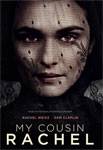Rachel Weisz My Cousin Rachel
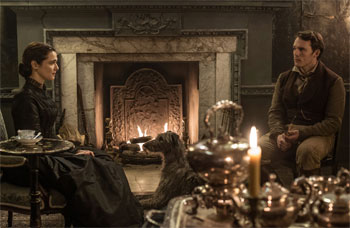
Rachel Weisz My Cousin Rachel
Cast: Sam Claflin, Rachel Weisz, Holliday Grainger
Director: Roger Michell
Genre: Drama, Mystery, Romance
Rated: PG
Running Time: 106 minutes
Synopsis: A dark and layered romance, My Cousin Rachel tells the story of a young Englishman who plots revenge against his mysterious and beautiful cousin, believing that she murdered his guardian. His feelings become complicated as he finds himself falling helplessly and obsessively in love with her.
My Cousin Rachel
Release Date: June 8th
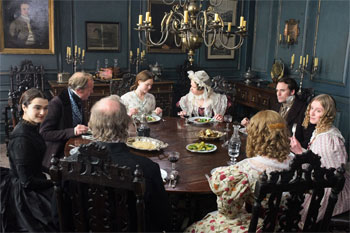 About The Production
About The Production
My Cousin Rachel was written in 1951 by Daphne du Maurier, whose outstanding work often combines suspense, passion and shockingly modern psychological portraits of men and women in intriguing and sometimes obsessive relationships. So cinematic was her writing that Alfred Hitchcock made films from three of her novels: Jamaica Inn, The Birds and Rebecca. Nicolas Roeg's psychological horror masterpiece Don't Look Now is also based on a story by du Maurier. On publication My Cousin Rachel instantly became one of du Maurier's most popular books and 20th Century Fox snapped up the film rights, going straight into production with two of the hottest stars of the day, Richard Burton and Olivia De Havilland. Released in 1952 the film garnered four Oscar® nominations and a Golden Globe Award for the young Burton as 'New Star of the Year." Steeped in a wonderfully powerful atmosphere of desire and suspicion, the book tells the story of a rather naive young bachelor struggling to determine if his deceased guardian's charming widow is either the woman of his dreams… or a cold-blooded killer and inheritance-chasing gold-digger. But when Rachel eventually arrives to visit the estate of her late husband, Philip meets a woman who seems nothing like the black-hearted poisoner of Ambrose's deathbed ravings.
Key to Roger Michell's adaptation is his decision to fully embrace the novel's thrilling ambiguity, the spell of which Daphne du Maurier never breaks. The story is the search for the truth, a search that delightfully torments the reader, torments Philip … and still continues to haunt the film's final moments.
'I think if you absolutely know one way or the other what Rachel has done, the story doesn't work," says Roger Michell. 'It's exciting to make a film where part of the fun is knowing that people will leave the theatre debating… did she or didn't she? I hope people love the mystery of that as much as I do. And I hope they enjoy going on a rollercoaster-ride with a this ill-matched couple who are thrown into a kind of emotional washing machine and find themselves churned about as they try to puzzle out each other's motives, assumptions, values, each other's sense of truth."
'I think for Philip, Rachel feels like she comes from another world. And in a way, she really does. She's from a distant and exotic country. Her language, her clothes, her appetites, her understanding of the world are utterly foreign to him. She's beautiful, articulate, fun, and completely disrespectful of stuffy contemporary convention. The book is set in the 19th Century, but written in 1950. So I think of it as a kind of post-Freudian version of Jane Austen, if you will. On one level it's a period thriller about falling in love and family estates and so on, but on another, it's conversation about sexuality, about women's freedom in a man's world, about issues of women's power. I wanted Rachel to feel in part like a woman from 2017 who parachuted into that world … the woman who fell to earth"
Roger Michell's long-time producing partner Kevin Loader was impressed by the way the writer director sprinkled seeds of doubt throughout the screenplay and used them to explore the gulf between romantic dreams and the realities of how power, money and social rules are tied up in relationships. 'The idea of the -mysterious outsider' is so universally resonant, and a great narrative hook on which to build a film," Loader notes. 'What emerged from Roger's adaptation is a taut psychological thriller that's full of observations on the nature of romantic love, infatuation and sexual relations between men and women, especially in closed societies. And it leads to a climactic moment, shrouded in ambiguity as to who is culpable and who is not."
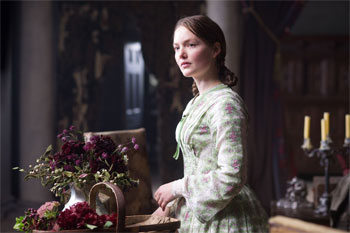 Loader was also struck by how completely contemporary Rachel seemed in Roger Michell's adaptation, chafing against the constrictions of 19th century English manners. 'Rachel is a very modern woman stuck in a rather antiquated, provincial world. I think part of the reason Philip and others find her so difficult to comprehend is because she's not like anyone they've met before," says Loader. 'She's headstrong, she plays her cards quite close to her chest and she takes pleasure in her own sexuality. All of these were quite shocking ideas for 1839. I think that tension is something Daphne du Maurier was thinking about in the 1950s and that's why it's just as resonant now."
Loader was also struck by how completely contemporary Rachel seemed in Roger Michell's adaptation, chafing against the constrictions of 19th century English manners. 'Rachel is a very modern woman stuck in a rather antiquated, provincial world. I think part of the reason Philip and others find her so difficult to comprehend is because she's not like anyone they've met before," says Loader. 'She's headstrong, she plays her cards quite close to her chest and she takes pleasure in her own sexuality. All of these were quite shocking ideas for 1839. I think that tension is something Daphne du Maurier was thinking about in the 1950s and that's why it's just as resonant now." Before taking the leap, it was vital to both Roger Michell and Loader to get the blessing of Daphne du Maurier's estate, and they were gratified to find her family highly enthusiastic about this particular adaptation. Grace Browning, du Maurier's granddaughter, says: 'Roger is a well-respected filmmaker, and the fact that he was adapting the book himself was interesting to me. When I found out Rachel Weisz was attached, I felt she couldn't be more right for this part. She brings such truthfulness to all the characters she's ever played. Du Maurier was brilliant at writing women characters; there's such depth to all of them, and I think any actress would relish the chance to play one."
The Mystery Of Rachel
Coming to England in the wake of her husband's unexpected death, Rachel soon has the whole of Ambrose Ashley's estate flummoxed, enthralled by her behaviour and at times shocked by it. It would take an actor equally alluring and confounding to showcase those contradictions in a believable way.
Academy Award® winner Rachel Weisz is known for giving highly nuanced performances in a wide range of film roles, from The Constant Gardener to The Deep Blue Sea and The Lobster. 'Rachel (Weisz) was able to bring a haunting quality to the story, which is really the key to the whole film. You just don't ever know for certain whether the character of Cousin Rachel is guilty or not. Rachel (Weisz) carries that off brilliantly. In one moment she's charming, and in the next she's furious but still seems as if she is hiding something. Every one of those moments is played with conviction," says Roger Michell.
For her part, Rachel Weisz remembers that as soon as she finished the script she urgently called Roger Michell to ask him: is she or isn't she innocent? His answer was galvanizing: 'Roger Michell told me he didn't know and he didn't want to know for sure. I thought that would be very exciting to explore and it made me really want to do this project," says Rachel Weisz.
The chance to work with Roger Michell was also a draw for Rachel Weisz. "I've always wanted to work with Roger Michell, as I've been a fan for a long time. I found that he's a director who really searches to find out what makes actors tick. He's always gentle and kind, but he's exacting. He knows precisely what he wants, and he also likes things to be surprising. There's nothing rigid or boring about the way he works," she describes.
Rachel Weisz embraced both the light and dark facets of her character equally, never giving one sway over the other. On the one hand, she approached Rachel as a woman who arrives in England still reeling from her husband's death, only to find herself a fish-out-of water in a new culture. But she was also playing a woman caught off guard by her attraction to her late husband's heir.
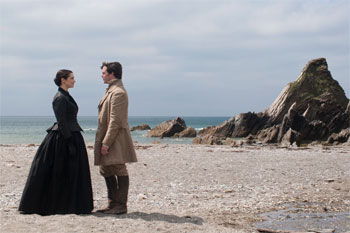 'She's just lost her husband, travels to this farm, his house, that he's been telling her about, and there she meets this man who is the spitting image of what her husband would have looked like 20 years ago –young and handsome, and at first, there's something quite magical about it all," observes Weisz.
'She's just lost her husband, travels to this farm, his house, that he's been telling her about, and there she meets this man who is the spitting image of what her husband would have looked like 20 years ago –young and handsome, and at first, there's something quite magical about it all," observes Weisz. At the same time, Rachel Weisz plays Rachel as defiantly independent and cagey about her Italian past.
Focused on forging a financial future for herself, she toys with Philip's all-consuming affections and shows no interest in doing things the conventional way, even when she knows society disapproves. -She's quite bohemian and exotic and very sexually liberated for her times," Rachel Weisz points out. 'She's aware that to others she comes off as transgressive and provocative because she has her own ideas about the way in which a woman should be allowed to live. She's definitely not going to be content to be owned by a man and be treated as a piece of property."
Rachel also has secrets, both financial and personal, that seem to hang over everything. 'The whole fun of the film is to trying to figure out whether Rachel can be trusted, and I just love that the story is equally weighted both ways. I think it will divide people on the question of whether or not Rachel is up to no good," says Rachel Weisz. 'That's what makes it such an unusual love story and so compelling and haunting. It asks how much do you really ever know a person and can your impressions of someone go completely, devastatingly wrong?"
For Kevin Loader, Rachel Weisz's carefully shaded performance is the engine that drives the mystery. "Rachel Weisz IS Cousin Rachel," he says. 'We needed someone who would be believable as an Englishwoman with an Italian background, who could be seen as exotic, highly intelligent and fiercely in charge of her own destiny. But she also had to have a visible vulnerability, a deep sense that her material circumstances had changed and she has to have an impenetrable sadness on the inside. There are few actresses who could have combined all those things as well as Rachel has."
For actor Pierfrancesco Favino, who plays Rachel's Italian confidant Rainaldi, Rachel Weisz has a rare ability to act like a mirror, allowing different audience members to see her actions in different ways, which was the heart of the challenge in playing Rachel.
'You can so easily project your own feelings and perceptions about what Cousin Rachel is doing onto Rachel Weisz, which gives the audience tremendous space for mystery," Favino concludes.
From Revenge, To Mad Love, To Fear
As a sheltered orphan most of his life, with no mother or sisters to guide him, Philip Ashley is a man with little experience with women when he meets Cousin Rachel. He's lived a life of isolation on his adoptive cousin's estate and though he initially intends to seek retribution against Rachel, she instead ignites in him a longing he's never even known possible, a longing so intense he then becomes unsure he can trust it.
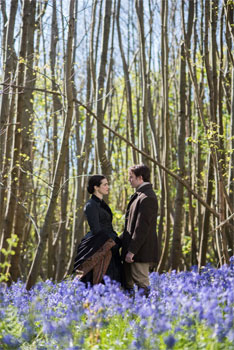 To play the part of Philip, Roger Michell was in search of one of a new generation of emotionally complex British actors, someone who could traverse seamlessly from vengefulness to romantic ecstasy to the most doubt-ridden torment. 'We watched a lot of films and Sam Claflin just popped out as exceptionally appropriate," the writer-director remembers. 'We asked him to do a couple of screen tests and he was incredibly persuasive. He's sensitive, he's smart, but he's also youthful and vigorous. He's got the lot."
To play the part of Philip, Roger Michell was in search of one of a new generation of emotionally complex British actors, someone who could traverse seamlessly from vengefulness to romantic ecstasy to the most doubt-ridden torment. 'We watched a lot of films and Sam Claflin just popped out as exceptionally appropriate," the writer-director remembers. 'We asked him to do a couple of screen tests and he was incredibly persuasive. He's sensitive, he's smart, but he's also youthful and vigorous. He's got the lot." Sam Claflin has been rapidly rising since he came to the fore in ME Before You, Pirates Of The Caribbean: On Stranger Tides and as Finnick O'Dair in The Hunger Games series. For producer Kevin Loader, he brought two conflicting qualities essential for Philip Ashley: "He had to have an almost puppy-like boyishness but also a charming manliness, and Sam has the facility to play both. A husband and a father in real life and a very together young person, he can be very strong and magnetic but he also has a natural boyishness about him. He was just perfect for this innocent and naive young man who knows nothing about women."
Sam Claflin found the character full of fascination. 'I've loved playing Philip and entering his very ambiguous world," he says. 'I feel I've been pushed and challenged in new ways."
He especially enjoyed taking Philip through 180-degree shifts in his thinking about Rachel.
'Initially, Philip suspects Rachel of foul play, and he comes in with a lot of judgement against her," notes Sam Claflin. 'He's made his mind up that he despises her before he even meets her. But he's slowly bewitched by her, due to her mysterious nature, and because she's different to any of the women that he knows, though he doesn't know many women at all. Soon, she has this incredible intriguing hold over him."
Sam Claflin admits he developed his own ideas about the truth of Rachel, but notes that Roger Michell did not want to discuss them even for a second. 'Right from the beginning Roger Michell said -I don't even want to know your theories. I want to leave it to the audience to decide.' And that's really what drew me to the film. I'm so excited to hear other people's thoughts about what really happened. I hope it's the kind of story where you can get lost within it and leave the theatre asking questions."
While he was exploring the many facets of Rachel, Sam Claflin was also diving into the life of a country farmer, taking lessons not only in horseback riding but also wielding a scythe and ploughing fields. Says Kevin Loader: 'Sam showed incredible dedication to fully inhabiting every aspect of Philip."
Daphne du Maurier's granddaughter, Grace Browning, also found herself moved by the way Claflin's performance acutely captured du Maurier's Philip, a naïve young man swept up by emotions he's never experienced. "I think Sam brings the innocence that is essential to the role of Philip, and you completely believe that he could be manipulated by Rachel," she concludes.
Questioning Rachel: The Supporting Cast
As Philip is swept off his feet by Cousin Rachel and starts to support her financially from Ambrose's accounts, those who were close to Ambrose and are protective of Philip watch his behaviour with mounting dismay and anxiety. Among those most upended by his sudden obsession with Rachel is Louise, Philip's confidante since childhood, who has long harbored her own unrequited crush on him. Rising star of both screen and stage Holliday Grainger – known for her roles as Lucrezia Borgia in Showtime's The Borgias and as Estella in Mike Newell's Great Expectations – plays Louise as a loyal friend who tries to protect Philip even as her own heart is breaking.
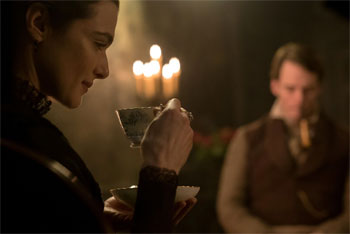 "Louise is secretly, desperately in love with Philip, and she's really been his one true friend on the estate, until Cousin Rachel turns up and changes everything," says HollidayGrainger. 'There's always been trust and affection and a fun camaraderie between Louise and Philip, so when Louise sees that Rachel is having so much influence over him it's very upsetting and concerning to her."
"Louise is secretly, desperately in love with Philip, and she's really been his one true friend on the estate, until Cousin Rachel turns up and changes everything," says HollidayGrainger. 'There's always been trust and affection and a fun camaraderie between Louise and Philip, so when Louise sees that Rachel is having so much influence over him it's very upsetting and concerning to her." Holliday Grainger notes that Louise is another person confounded by Rachel, finding herself unsure of how much of her feelings are based in envy and how much in the perceived danger Rachel poses to Philip.
'I think Louise is insanely jealous of Rachel," Holliday Grainger confesses. 'Rachel is so beautiful and alluring – and she doesn't play by the same social rules that everyone else feels they must in their village. Rachel has this kind of wry, knowing smile and she makes fun of their traditional English ways. I think that's what everyone falls for. But Louise is the one person who doesn't allow herself to fall for Rachel's charms believing that her charms could be a form of manipulation."
Kevin Loader tells how Holliday Grainger evoked the deeply relatable emotions of a lonely young woman trying to be good and kind while her dreams are clearly being shattered. 'Holliday Grainger has an amazing ability to transform in the moment," he observes. 'So you see her laughing and being close with Philip, and then at the same time you see her deep pain that he's going off on this other course."
Rachel Weisz was also taken with how Grainger expressed mixed feelings towards her character. "Holliday Grainger is a fantastic actress. She has grace, wit, intelligence, great beauty – and I really believed her," says Rachel Weisz. 'Louise does not trust my character, and every scene I'd look over at Holliday and she'd be looking at me like she just wanted to remove me from the room, and it was so real."
Louise's father is Nick Kendall, played by Scottish actor Iain Glen ('Game of Thrones"), who serves both as Philip's godfather and the legal guardian of Ambrose's estate. Glen describes Nick Kendall as 'trying to look after Philip's more youthful impulses. He sees Philip as quite hot headed, but he also knows Philip is much adored by his daughter Louise. So Kendall tries to be the steady head - a kind, stalwart man who looks after Philip's best interests."
But what exactly are Philip's best interests when it comes to Rachel? Glen observes, 'Kendall's feelings towards Rachel ebb and flow during the course of the story in a way that I think mirrors the audience. There's great passion in the air, there's great unpredictability and suspense, but Kendall is the one trying to keep a clear view as to what is actually unfolding."
Writer/Director Roger Michell was delighted to have his first opportunity to collaborate with Glen. "I've always wanted to work with Iain," offers Roger Michell, 'and we were very lucky to get someone of his stature to play Kendall. He and Holliday Grainger are very important bricks in the construction of the entire film."
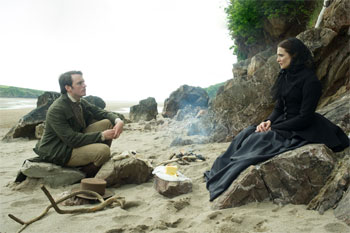 Adds Loader: "Iain Glen brings a benign goodness that shines out of him, so you feel his affection for Philip, but you also see a steely interior, and consequently it's pretty obvious when he disapproves of Philip's actions. He has to be the counter balance to Philip's impetuous obsession with Rachel." Rounding out the main cast is one of the story's most shadowy characters: Rachel's Italian compatriot and lawyer, Rainaldi, whose true role in her life is a mystery that begins to eat away at Philip.
Adds Loader: "Iain Glen brings a benign goodness that shines out of him, so you feel his affection for Philip, but you also see a steely interior, and consequently it's pretty obvious when he disapproves of Philip's actions. He has to be the counter balance to Philip's impetuous obsession with Rachel." Rounding out the main cast is one of the story's most shadowy characters: Rachel's Italian compatriot and lawyer, Rainaldi, whose true role in her life is a mystery that begins to eat away at Philip. Italian actor Pierfrancesco Favino (Rush, World War Z, Night At The Museum) relished the opportunity to play Pierfrancesco Favino. He explains: "What I like about this movie is that you never completely know what's real and what's not. With such an ambiguous character as Rainaldi, you have to play it between the lines, which for an actor is tremendous fun."
Says Roger Michell, 'Rainaldi is cunning, he's threatening, and he's charismatic, but he always has a strange ambivalence about him, which fits what I wanted to do with the story so well. He's a really marvellous actor."
Adds Loader: "Rainaldi is right at the core of the ambiguity. He is possibly a rogue and possibly having an affair with Rachel and he's a foreigner that nobody trusts - and yet it's all carried off with a kind of dazzling smoothness on the surface."
A Dark Estate, A Dangerous Coast
To bring the detail and beauty of the 19th century to life, Roger Michell worked with a close-knit team of collaborators, including director of photography Mike Ely, production designer Alice Normington and costume designer Dinah Collin.
Exactly when the novel is set is unclear: Michell chose to place his screenplay in the late 1830s, just on the brink of the radical and rapid changes of the Victorian Age. That is between Austen and Dickens and just before the coming of railways that would so alter rural English society.
'This allowed Roger to use to explore a society on the cusp of transition," observes Kevin Loader. 'He set the film at the very beginning of the industrial revolution, when change is just starting to encroach on the countryside."
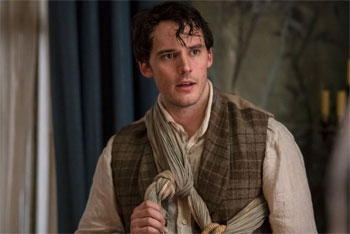 Casting the estate was nearly as involving an enterprise as casting the main characters, since it too had to have a strong, mystery-laden personality. Ultimately, the filmmakers settled on Surrey's West Horsley Place in the southeast corner of England. This sprawling medieval house, constructed between the 16th and 18th centuries, had not been touched for many decades so it had both the decrepitude and the potential that was needed to create an estate that transforms with Rachel's arrival.
Casting the estate was nearly as involving an enterprise as casting the main characters, since it too had to have a strong, mystery-laden personality. Ultimately, the filmmakers settled on Surrey's West Horsley Place in the southeast corner of England. This sprawling medieval house, constructed between the 16th and 18th centuries, had not been touched for many decades so it had both the decrepitude and the potential that was needed to create an estate that transforms with Rachel's arrival. The filmmakers had made a serendipitous find. It turns out that West Horsley Place was about to be renovated by a new owner, the historian and broadcaster Bamber Gascoigne and that meant production designer Alice Normington and her team had relatively free rein before the new construction began.
Explains Alice Normington: "Unlike National Trust houses, where you're governed by a lot of rules, Bamber runs this, so we had so much freedom. He was amazing to us, and this great house gave us an exciting blank canvas on which to create."
Alice Normington set out with passion to create Philip's mud-crusted, dusty surroundings and then to bring them to life with Rachel's sudden and disruptive entrance. Loader comments: 'West Horsley is really a big farm house, which is exactly what we needed. It allowed us to transform it from a house that was largely occupied by men, dogs and mud before Rachel arrives to a place that feels much more civilized, and with a lightness of touch, as Rachel's influence takes over."
He adds: "This was a beautiful and brilliant opportunity to get a historic house that had yet to be restored and have freedom with it, at least up to a point. The Mary Roxburghe Trust that owns the house, and Bamber, who chairs the trust and inherited the house, allowed us to treat it as a kind of ancient standing set. Its incredible texture would have been impossible to reproduce."
Adds Roger Michell: "We were all really surprised when we set foot inside it for the first time. We all rather fell in love – the spirit of the place was so alive and raw."
For du Maurier's granddaughter, Grace Browning, the house was everything she imagined it could be reading the novel. "When I read the book, this is exactly the house that I pictured in my mind," she offers. 'It was a welcome relief to see how brilliantly the house fit the book."
Most of all, Normington wanted to create a big impact when Rachel arrives. 'I felt things should feel very basic and primitive in Philip's countryside world, so that Rachel's arrival with all her mysterious ideas from the world-at-large feels enormous and life altering."
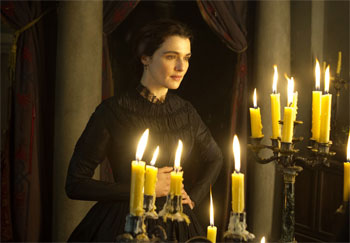 One of Normington's favorite sets in the house is Rachel's bedroom, which Normington describes as "the only room in the house where there is any sign of a woman". She continues, 'The rest of the house is very male-dominated, so we gave this room a strong femininity, though in a dark, mysterious way. We started with the wallpaper, as dark chinoiserie was very popular then in women's boudoirs. It gives us a decorative feel and introduces the blue theme. That started in the novel, and it was always known as the blue room, but I also thought blue was the right color for Rachel."
One of Normington's favorite sets in the house is Rachel's bedroom, which Normington describes as "the only room in the house where there is any sign of a woman". She continues, 'The rest of the house is very male-dominated, so we gave this room a strong femininity, though in a dark, mysterious way. We started with the wallpaper, as dark chinoiserie was very popular then in women's boudoirs. It gives us a decorative feel and introduces the blue theme. That started in the novel, and it was always known as the blue room, but I also thought blue was the right color for Rachel." Other locations include Newington House, south of Oxford, which stands in for the home of the nouveau riche Kendall family; Stockers Farm in Rickmansworth where the stable blocks were located; and Old Amersham, a 13th Century village in Buckinghamshire, where all the town scenes were filmed. The Italian sequences at the beginning of the film were shot in Arezzo and Florence.
For the coast itself, the production journeyed to Devon, renowned for its sandy bays and steep cliffs. 'The beauty of Devon was perfect for exploring the relationship to the sea to that is so important to all of Daphne du Maurier's writing," says Loader.
The ambience of the locations captured the imagination of the cast as well. Rachel Weisz concludes: 'Everything was so authentic. It gave us something real to build the emotions around, rather than polished, fake set pieces."
That same authenticity extended to Dinah Collins' evocative mid-19th century costumes. Collins dove into research, uncovering a period in England when both men's and women's clothing were becoming more practical and workmanlike as the industrial revolution began to churn. As Cousin Rachel was a new widow in the throes of mourning, she could only travel with a few items to England. So Collins dressed Weisz in a spare series of black frocks throughout much of the film that give her a strong but mysterious look. Then she added a range of details. 'Cousin Rachel doesn't have a lot of clothing with her, but she has lots of accessories," explains Collins, 'including her shawl, her riding cape and lots of lacy headwear that contributes to her exotic feel."
One vital item on Collins' mind from the start was the family heirloom necklace that Philip gifts to Rachel, setting off shock around the estate. In search of a memorable and unusually evocative piece, the costume designer was inspired by a 19th century portrait she'd seen. 'Roger had written it as a choker in the script but this was a portrait of a woman wearing a very simple pearl drop that was so elegant," she recalls. Collins worked closely with a British jeweller to create a similar style of necklace for the film.
'We found the most amazingly beautiful pearls, and they look fantastic on Rachel's skin," she muses. Collins also enjoyed creating a contrast with Holliday Grainger's Louise, who wears a brighter, tweedier palette. 'Roger wanted her to feel a bit like a tomboy but also fresh and flowery," notes the designer.
Pierfrancesco Favino adored the costumes Collins created for Rainaldi, and the way they highlight the contrast between Rainaldi and the more conventionally dressed Philip. "Rainaldi looks immaculate next to Philip's rough country man. His look was very carefully studied and so well designed it really helped to create the mystery surrounding the character," Favino explains.
Mystery was one element central to every detail of My Cousin Rachel. Sums up Loader: 'My Cousin Rachel is one of du Maurier's most psychologically sophisticated works. It really taps into all the discomforts of the mind, into our deepest emotions of love and death and their accompanying fears. There had to been an uneasiness beneath the surface throughout the film and that is why it was such great raw material for everyone to work with, both cast and crew."
Daphne Du Maurier (1907 - 1989)
She was one of the most popular writers of her times, capturing the zeitgeist, but Daphne du Maurier was also ahead of her times, and continues to be a major influence on modern novelists today– her novels show how the most gripping thrillers, no matter how packed with romantic intrigue, natural forces and adventure, can also illuminate our most private emotions, complex relationships and the power of the past.
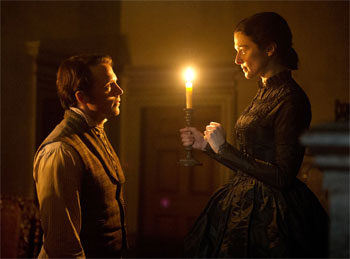 Like many of her female characters, du Maurier was herself a bold woman who lived on her own terms. She was born in 1907 into an artistic family - the granddaughter of famed caricaturist George du Maurier and the daughter of well-known stage actors George du Maurier and Muriel Beaumont. Raised amongst all manner of creative types, du Maurier's frequent family visitors while growing up included J.M. Barrie, creator of Peter Pan, and novelist and screenwriter Edgar Wallace who wrote KING KONG, helping to further ignite a very eager and daring imagination.
Like many of her female characters, du Maurier was herself a bold woman who lived on her own terms. She was born in 1907 into an artistic family - the granddaughter of famed caricaturist George du Maurier and the daughter of well-known stage actors George du Maurier and Muriel Beaumont. Raised amongst all manner of creative types, du Maurier's frequent family visitors while growing up included J.M. Barrie, creator of Peter Pan, and novelist and screenwriter Edgar Wallace who wrote KING KONG, helping to further ignite a very eager and daring imagination. By the time du Maurier was in her teens she was already getting short stories in print. In 1931, she published her debut novel: The Loving Spirit, the story of three generations of love and loss in a Cornwall family under the spell of the sea. This was followed by a string of major literary successes including Jamaica Inn and Rebecca, both of which would become films directed by the rising master of suspense, Alfred Hitchcock. Now a household name and the highest-paid author of the day – male or female -- du Maurier continued to enjoy tremendous popularity with her novels Frenchman's Creek, Hungry Hill, Mary Anne, The Scapegoat, The Glass Blowers, The Flight of the Falcon, The House on the Strand and Rule Britannia.
My Cousin Rachel was her 8th novel and one of her most talked-about, defining the sharp edge of her insight into the hidden human psyche and the complicated lives of smart, strong women for which she is now known for. Though she was often mislabelled as a romance writer, du Maurier's refusal to come down on one side or the other of Rachel's guilt or innocence made the book something quite rare in its time – and helped to showcase the nervy modernism and psychological depths of her writing.
Today, du Maurier's writing is instantly definable to her many fans. Rachel Weisz elaborates: "du Maurier's stories always have a tightly coiled plot, a thriller-like component, mystery and most especially very strong, interesting women. That's what makes them still so cinematic."
Actor Iain Glen observes: "I think it's brave writing. You could easily pen Rachel's story so that it would fall clearly on one side or the other. Du Maurier didn't do that. Instead, like the very best writing, she puts the onus on the audience as to what to think and feel about it."
Grace Browning, Daphne du Maurier's grand-daughter hopes that this new screen version will re-introduce the pleasures of du Maurier to some and bring her books to a new generation. "I think there's much more depth to her writing than many people initially think. She hated that after Rebecca she was tainted with the romantic novelist moniker. Many of her short stories are incredibly dark - you'd never think they'd been written by her. Her common themes are jealousy, deception, the motivation of people and her characters," Browning sums up. 'They are human themes that are always relevant and I think that's why people keep reading her work."
My Cousin Rachel
Release Date: June 8th
Have You Seen This?
MORE
- Mission: Impossible Fallout
- Glenn Close The Wife
- Allison Chhorn Stanley's Mouth Interview
- Benicio Del Toro Sicario: Day of the Soldado
- Dame Judi Dench Tea With The Dames
- Sandra Bullock Ocean's 8
- Chris Pratt Jurassic World: Fallen Kingdom
- Claudia Sangiorgi Dalimore and Michelle Grace...
- Rachel McAdams Disobedience Interview
- Sebastián Lelio and Alessandro Nivola...
- Perri Cummings Trench Interview

